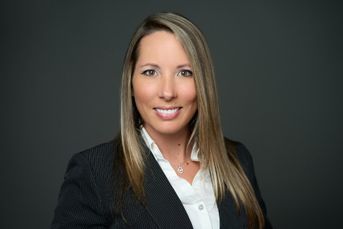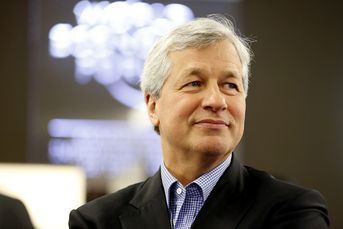Community Leadership Awards
Ken Clark, Barry Glassman, Gerry Strid and Arnerich Massena & Associates Inc. were named winners of the 2007 Community Leadership Awards, which were presented by the Invest in Others Charitable Foundation and InvestmentNews, late last month in New York.
Ken Clark, Barry Glassman, Gerry Strid and Arnerich Massena & Associates Inc. were named winners of the 2007 Community Leadership Awards, which were presented by the Invest in Others Charitable Foundation and InvestmentNews, late last month in New York.
Entries were evaluated based on an adviser or adviser team’s level of involvement in an organization, their contributions and the lasting impact of their efforts. For their exemplary leadership and contributions to their communities, the winners received $10,000.
The winners are featured in this special report.
Mentoring Excellence Award: Ken Clark
Josh Smith, 26, remembers returning by bus from a weeklong summer camp after his high-school graduation — and being greeted by police who arrested him as he stepped off.
For Mr. Smith, it was nothing new. The son of a single mom who worked two jobs, he ran with a questionable crowd in Dana Point, Calif. He’d been in a gang throughout his teen years. The latest charges, which included assault, were simply one more mark on an already considerable rap sheet.
What was new to him, however, was the kindness of financial planner Ken Clark.
Mr. Clark, a volunteer mentor for Young Life South Coast of Laguna Niguel, Calif., which had sponsored the camp Mr. Smith attended, basically saved his life, Mr. Smith said.
“If I hadn’t met Ken when I did, I could have very easily fallen back into what I had been doing — running the streets, getting arrested and just being up to no good,” he said.
Mr. Clark, 32, an independent financial planner in Laguna Niguel, was honored Sept. 26 in New York with a Mentoring Excellence Award as part of the Community Leadership Awards event sponsored by the Invest in Others Charitable Foundation and InvestmentNews.
“The guy is awesome,” said Mr. Smith, now a full-time Young Life staff member. “He’s poured his heart into this ministry and into other people’s lives for so long … he deserves some recognition for it.”
Mr. Clark first became involved in Young Life 12 years ago as a college student at Pepperdine University in Malibu, Calif. His girlfriend, Michele, who later became his wife, volunteered for the group. He signed on as a way to support her.
Without meaning to, he found himself devoted to the at-risk teens he was mentoring. “I fell in love with the kids,” he explained. “They’re missing something in their lives — maybe a dad or a positive influence. It was nothing noble on our part, but rather that our hearts were drawn to these kids.”
Young Life, headquartered in Colorado Springs, Colo., is a Christian ministry that focuses on mentoring at-risk teens.
Operating in 800-plus U.S. communities and in more than 50 countries, the non-profit organization relies on volunteers such as Mr. Clark to help these teens make changes in their lives that will allow them to reach their full potential.
But Mr. Clark’s involvement in the group eventually went beyond volunteering. In 2002, his wife became pregnant with their first child and wanted to stop working. So Mr. Clark took over her job, which happened to be director of the local Young Life chapter.
At the same time, however, he was managing $25 million for clients as an independent financial planner. Somehow, in between serving his clients and being a new dad, he managed to boost his local Young Life volunteer hours from 1,000 a year to more than 10,000 by the end of 2006, when he stepped down as director.
As a result of his efforts, hundreds of kids have walked away from destructive lifestyles. Kelly Flynn, 18, is one of them.
In her freshman year of high school, Ms. Flynn’s parents sent her to a six-week wilderness program in Utah after a drug overdose landed her in the hospital.
“I was heavy into drugs and didn’t really care what I did or what happened to me,” she said.
When Ms. Flynn returned from the -program, she switched schools. Although she was going to Alcoholics Anonymous meetings and had stopped much of her self-destructive behavior, she said, she still didn’t care about herself very much.
Ms. Flynn began attending weekly Young Life meetings at Mr. Clark’s house.
“One night, I was at his house, and my heart was heavy because I’d gone a little wild the night before,” she recalled. Ms. Flynn wanted to open up. “He always told all of us that if we ever needed to talk, to let him know. So I asked if I could talk to him and his wife privately,” she said.
As a teen ashamed of her destructive behavior, Ms. Flynn was scared of what they would say when she told them everything bad she’d ever done.
“But [Ken] just said, “OK,’” she said. “I was shocked. I had just told him everything about me and he didn’t care. His confidence in my future was amazing.”
Now a freshman at Westmont College in Santa Barbara, Calif., Ms. Flynn is majoring in biology in hopes of pursuing a career as a pediatrician.
“I don’t know where I would have ended up without him,” she said. “He taught me self-worth.”
Community Leadership Award: Barry Glassman
Certified financial planner Barry Glassman was in high school when he first raised money for a brain cancer patient. Sporting a tuxedo, he emceed a lip-syncing contest among fellow students that raised $3,000 for the patient — his friend, Seth Feldman.
Twenty years since his friend’s subsequent death, Mr. Glassman, now 37 and a senior vice president at Cassaday & Co. Inc. in McLean, Va., remains committed to helping brain cancer patients. He is both a board member for the Watertown, Mass.-based Brain Tumor Society and a co-chairman of the Cassidy & Pinkard Colliers Race for Hope in Washington.
His continuing dedication resulted in his winning the Community Leadership Award at the Community Leadership Awards, sponsored by the Invest in Others Charitable Foundation and InvestmentNews.
“I felt so strongly that he should win because he goes above and beyond,” said Nicola Beddow, a Race for Hope founder. “His leadership and ability to motivate others makes us thankful that he got involved.”
In fall 1997, a small group in the Washington area began organizing a 5-kilometer race to raise money for brain cancer research. The event was the idea of Dana Dacz-kow-ski, a committed runner who had battled brain cancer for five years.
As Ms. Daczkowski’s sister, Ms. Beddow was among the planners.
“We hung up flyers [in the Washington area], and Barry saw one,” said Ms. Beddow, of Falls Church, Va. “We were very fortunate that he happened to see it, because his involvement kicked up the level of the race tenfold.”
The first Race for Hope, held in May 1998, attracted a few hundred runners and raised $65,000 for the Brain Tumor Society. Ms. Daczkow-ski, confined to a wheelchair, participated in the race. Two months later, at age 31, she died.
But Ms. Beddow remained involved as a race co-chairwoman. Under Mr. Glassman’s leadership, she watched her sister’s idea mushroom into an event that this year attracted 6,000 participants and raised $1.5 million.
“It just got bigger and better each year,” Ms. Beddow said.
Key to that growth has been Mr. Glassman’s ability to encourage the participation of large teams and corporate sponsors. For instance, Washington commercial-real-estate firm Cassidy & Pinkard Colliers signed on as the race’s title sponsor seven years ago, after a partner there was diagnosed with a brain tumor.
Mr. Glassman also has encouraged collaboration among groups whose missions are the same: to fund research for a brain cancer cure. As a result, Accelerate Brain Cancer Cure Inc. became a co-beneficiary of the race this year.
Also known as ABC, the Washington non-profit was launched in 2001 by philanthropists, including Dulles, Va.-based AOL LLC’s co-founder, Steve Case, and his brother, Dan, who suffered from brain cancer. Dan died in 2002.
In a letter to InvestmentNews, Mr. Case, chairman of the ABC board, wrote, “Thousands of brain tumor patients and their families and friends have been touched in some way by Barry’s passionate efforts.”
Michael Kwinn Jr., an Army lieutenant colonel and professor at the U.S. Military Academy at West Point in Highland Falls, N.Y., is among them.
In early 2002, his son, Michael III, then 13, was diagnosed with a brainstem tumor. The teen wanted to raise money to help others in his situation, and the Race for Hope was an ideal place for he and his dad to present a donation.
“I had no idea how much they were going to donate. I didn’t ask,” Mr. Glassman said. “But they had a stack of checks that must have been six inches thick. Some of the checks were for $10. It was an over-the-top motivator for us.”
Those checks, collected in just two weeks, totaled $15,000.
“Barry made us feel special,” Mr. Kwinn said. “He has a way of making everyone feel like they’re the most important person in the world.”
The next year, Michael returned with $50,000 in donations. By then, he was unable to move his arms and legs, and needed an oxygen tank to help him breathe.
Yet surrounded by about 100 U.S. service members who had pushed Michael’s wheelchair along as they ran, the young patient completed the race.
“Everyone in sight stopped what they were doing and applauded as Michael crossed the finish line,” Mr. Glassman recalled.
Two weeks later, 14-year-old Michael died.
Despite the sadness Mr. Glassman sees, he has no plans to end his involvement.
“I get so much out of watching families and friends who share this one awful commonality get together to do something to effect change,” he explained.
He’s already set a fundraising goal of $2 million for next year’s race. To help reach that objective, Mr. Glassman is holding an Oct. 18 event at Teatro Goldoni, a Washington restaurant, in hopes of raising at least $15,000 from the 125 or so expected attendees.
But for this fundraiser, instead of donning a tuxedo as he did 20 years ago, he’ll put on an apron and head to the kitchen and help chef Fabrizio Aielli prepare a five-course meal for guests.
Volunteer of the Year: Gerald Strid
Some of Erik Strid’s earliest memories are of his father, Gerald, coming home from work in the winter without his coat or socks.
The elder Mr. Strid, now 64 and a managing director at the Strid Wealth Management Group, a Wachovia Securities Inc. affiliate in Berwyn, Pa., wasn’t facing hard times himself. Instead, he had given his warm clothing to a homeless person in Philadelphia. From time to time, the elder Mr. Strid also would gather up his family’s old clothes and blankets and give them away to the homeless.
“It was an informal thing he did on his own,” said Erik Strid, one of five children, who is managing director of Strid Wealth Management Group. “He always taught us that homelessness could happen to anyone.”
The elder Mr. Strid’s decades-long passion for helping the homeless, now manifesting itself through his involvement in Project H.O.M.E. in Philadelphia, led to his winning the Volunteer of the Year Award Sept. 26 in New York as part of the Community Leadership Awards event sponsored by the Invest in Others Charitable Foundation and InvestmentNews.
“Gerry is a really amazing person,” said Sister Mary Scullion, executive director and co-founder of Project H.O.M.E. “He not only gets directly involved with the people who live on the streets, but he also has been able to secure funding and resources. It’s a rare person who can do both those things.”
Sister Scullion met Mr. Strid at a wedding in 2000, which is when his informal efforts at helping the homeless took a turn.
“He asked if he could come see what [Project H.O.M.E.] was about, and then said he wanted to start by working with people who were living on the streets,” she said.
Project H.O.M.E. — which stands for Housing and Opportunities for Medical Care, Education and Em-ployment — addresses homelessness in Philadelphia through several programs, one of which is direct outreach.
That fit the bill for Mr. Strid. Accompanied by a Project H.O.M.E. staff member, he began dedicating one day every week to visiting the city’s streets, reaching out to homeless people.
Sometimes that involved offering food or conversation, or making them aware of shelters and other available services — or just offering a big hug.
“We’re kind of like shepherds watching the flock,” Mr. Strid said.
Son Erik, also a managing director at his father’s firm, views the weekly trips as inspiration. “He’s ministering to guys who might have bugs crawling on them or vomit on them, but he doesn’t care.”
Decades ago, Mr. Strid saw that many of the homeless were Vietnam vets who were unable to reassimilate themselves into society upon their return from the war.
Mr. Strid, who had narrowly escaped being drafted due to a broken back, realized how easily any one of those homeless men could have been him.
“How can I look down on them?” Erik Strid remembers his father saying to his children.
Mr. Strid sees little difference between himself and many of the homeless people.
“We bust each other’s chops just like I would with any of my friends,” he said. “But these guys, when we’re done talking, go looking for a nice, warm grate or a cardboard box to lie down on. I have a home; they don’t.”
What frustrates Mr. Strid, though, is how many people whose station in life is similar to his remain unaware of — and unmoved by — the indignities suffered by fellow human beings simply due to circumstances.
“When I’m done with my work on the streets, I drive a half hour to Villanova [Pa.] to my house and the kind of the life that I and everyone around me lives,” he said. “The separation of a half hour’s time between kids in comfy beds and someone freezing to death outside is huge. It more than makes me angry; it’s an injustice.”
Last year, after 14 months of Mr. Strid’s planning, Project H.O.M.E. held a gala that raised $1.5 million. It marked the non-profit’s largest-ever fundraiser.
“It was phenomenal,” said Sister Scullion. “It definitely raised the bar for us.”
At the moment, Mr. Strid is recovering from quadruple-bypass heart surgery. He’s hoping that his doctor soon will give him the OK to return to the streets.
In the meantime, Mr. Strid is building on the I Care theme of the 2006 gala by developing the I Care Fifty.
He wants to attract 50 people who will commit to donating $100,000 each over the next five years to benefit Project H.O.M.E.
“So far, I have 16 commitments,” Mr. Strid said. “But I’ve barely gotten started.”
Volunteer Team Award: Arnerich Massena & Associates
M. Lynn Spruill, chief operating officer and chief financial officer at Arnerich Massena & Associates in Portland, Ore., recently spent every Monday morning for nine months reading with Jordan, a third-grader at Irvington Elementary School. The school is located in a redeveloping area of northeast Portland.
“He was wary when we first met, but we got to know each other really well,” Mr. Spruill said of his young friend. “He struggled with reading at first, but by the end of the year he was blazing through his assignments.”
Mr. Spruill’s experience can be echoed by dozens of the Portland investment consulting firm’s em-ployees who volunteer their time to help Irvington’s children. The firm’s partnership with the school earned it the Volunteer Team Award at the Community Leadership Awards.
“We’re so fortunate to have such caring and committed people working with us to help our students,” said Cherie Allbaugh, Irvington’s school counselor.
Every year, Arnerich Massena employees dedicate 1,200 hours to reaching about 220 students at Irvington. The partnership was launched more than a decade ago with an after-school math-and-science program.
Since then, it has grown to encompass before-school reading-and-math mentorship programs, after-school boys’ and girls’ clubs, a homework club and summer camps for math, science and journalism.
In fact, kids in the journalism program produce a full-fledged newspaper called the Irvington Times. The students write articles about issues that interest them and their peers and then distribute the newspaper in the community.
Arnerich Massena also donates its surplus computers for use in the school, and the firm’s information-technology employees set up the computers and maintain them.
Company founder Tony Arnerich and his wife, Christine, “have a passion for children and for education,” Mr. Spruill said.
Their passion is infectious. Although volunteering obviously isn’t a condition of employment at Arnerich Massena, the majority of employees sign on to volunteer, he said.
Moreover, Mr. Spruill said he and others at the firm have been shocked by prospective employees’ reaction when they learn about the partnership with Irvington.
“It’s a company that’s willing to spend valuable time and lots of resources in a public school,” he said. “Even though it wasn’t created for this purpose, [the partnership] is a great recruiting tool.”
The firm is so committed to the partnership that it even has a full-time director of community services, Kate DeGraw, to manage it. She works collaboratively with the school’s principal and teachers to select content for the programs and spends much of her time during the day at school.
The children served through the reading and math programs are identified by teachers as trailing their peers in those areas.
The children face a variety of challenges, said Ms. Allbaugh, the counselor.
One girl would love to go to the library after school, but she can’t because she must care for her younger siblings while her mother works the swing shift in a nursing home. Another student can’t go home after school to study because no one is there, and is instead sent to his mom’s workplace, where finishing assignments can be a challenge.
And by having each volunteer assigned to a particular child each school year, the employees are able to forge a special relationship with their charges.
“Jordan and I spent a lot of time reading, but I also found out what he had done over the weekend, and he learned a lot about me,” Mr. Spruill said. “And because I’ve traveled a lot, we had a globe, and I’d point out where different places are.”
At the end of every school year, a celebration is held so families of the children involved in the various Arnerich Massena-sponsored programs can watch their kids show off what they have learned over the course of the year.
This year, Mr. Spruill has been assigned to another child, and he looks forward to making a new friend. “There’s just no better thing than watching a kid learn,” he said.
Learn more about reprints and licensing for this article.







